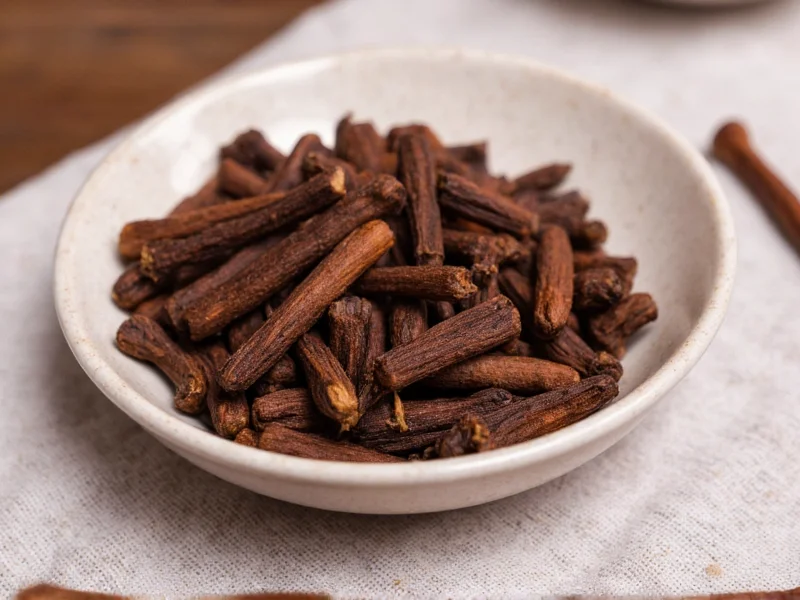Understanding clove taste transforms your culinary creations from ordinary to extraordinary. This ancient spice, harvested from Syzygium aromaticum flower buds, offers one of the most potent flavor profiles in the spice cabinet. Chefs and home cooks alike benefit from knowing precisely how cloves interact with other ingredients to create balanced dishes.
The Science Behind Clove Flavor
Eugenol dominates clove's chemical composition, accounting for 70-90% of its essential oil content. This phenolic compound creates the characteristic burning sensation similar to capsaicin in chili peppers, but with distinctive warm undertones. Secondary compounds like caryophyllene add earthy, woody notes, while minor constituents contribute subtle citrus and floral hints.
When you bite a whole clove, the initial sweetness quickly gives way to intense heat that numbs the tongue. This unique sensory experience explains why cloves work best when used sparingly or removed before serving. The flavor intensity varies by clove origin—Madagascar cloves taste sharper, while Indonesian varieties offer more floral notes.
How Cooking Transforms Clove Taste
Heat dramatically alters clove flavor chemistry. Raw cloves taste aggressively medicinal, but simmering releases their complexity while mellowing harsh edges. Consider these transformations:
| Preparation Method | Flavor Profile | Best Culinary Uses |
|---|---|---|
| Raw whole clove | Intensely pungent, numbing, medicinal | Ornamental (e.g., ham decoration) |
| Simmered whole | Warm, sweet, complex depth | Braises, stews, mulled beverages |
| Freshly ground | Sharper, more volatile notes | Dry rubs, spice blends |
| Pre-ground (store-bought) | Muted, one-dimensional | Quick baking applications |
Clove Taste Compared to Similar Spices
Many confuse cloves with allspice or nutmeg, but their flavor profiles differ significantly. Understanding these distinctions helps prevent recipe disasters:
- Cloves - Dominant eugenol creates intense warmth with bitter undertones and numbing sensation
- Allspice - Blends cinnamon, nutmeg, and clove notes without the medicinal sharpness
- Nutmeg - Softer, sweeter warmth without cloves' aggressive pungency
- Cinnamon - Primarily sweet with mild heat, lacking cloves' complex bitterness
When substituting, remember that clove flavor substitutes for clove taste requires careful adjustment. Replace 1 clove with 1/8 teaspoon ground allspice plus a pinch of cinnamon for closest approximation.
Mastering Clove Flavor in Cooking
Professional chefs leverage clove's powerful taste through strategic application. The best dishes featuring clove taste include:
- Meat braises - Cloves penetrate connective tissue, adding depth to pot roast or beef bourguignon
- Spiced beverages - Mulled wine and chai tea showcase clove's aromatic warmth
- Pickling solutions - Cloves provide backbone to vinegar-based preserves
- Baking applications - Gingerbread and pumpkin pie benefit from subtle clove notes
Avoid common mistakes like overusing ground cloves (they lose potency quickly) or leaving whole cloves in finished dishes. For balanced clove flavor in recipes, use one whole clove per serving in slow-cooked dishes, or 1/16 teaspoon ground clove per cup of liquid in beverages.
Why Clove Taste Varies by Application
The same clove tastes dramatically different depending on preparation. Whole cloves release flavor gradually during cooking, creating nuanced depth. Ground cloves deliver immediate, aggressive heat that can overwhelm delicate dishes. Toasting whole cloves before grinding intensifies their sweetness while reducing bitterness—a technique essential for authentic clove taste in Indian cuisine.
Storage significantly impacts flavor. Properly stored in airtight containers away from light, whole cloves maintain potency for 1-2 years. Ground cloves lose 75% of their volatile oils within 6 months, resulting in flat, one-dimensional taste. This explains why freshly ground clove taste differs so dramatically from pre-ground versions.
Perfect Pairings for Clove Flavor
Clove's complex profile harmonizes with specific ingredients:
- Sweet enhancers - Brown sugar, maple syrup, and dried fruits balance clove's bitterness
- Complementary spices - Cinnamon, star anise, and cardamom create layered warmth
- Acidic components - Citrus zest and vinegar cut through clove's oiliness
- Fatty bases - Coconut milk and animal fats carry clove's essential oils effectively
Understanding these interactions helps create balanced clove flavor combinations rather than overwhelming single-note dishes. In Middle Eastern cuisine, cloves pair with rosewater for sophisticated complexity, while Southeast Asian recipes combine them with lemongrass for bright contrast.
Frequently Asked Questions
Why do cloves taste numbing?
Cloves contain eugenol, which temporarily desensitizes nerve endings in the mouth. This compound interacts with TRPV1 receptors (the same ones activated by capsaicin), creating a warming sensation that can feel numbing at high concentrations. The effect is more pronounced with raw cloves than cooked applications.
Can you eat cloves raw?
Yes, but sparingly. Raw cloves deliver intense, concentrated flavor that can be overwhelming. One whole clove contains enough eugenol to cause mouth irritation if chewed extensively. Traditional medicinal uses involve holding a clove near a toothache for localized numbing, but culinary applications almost always involve cooking to mellow the harsh edges.
Why do cloves taste bitter?
The bitterness comes from eugenol acetate and other minor compounds in cloves. This bitterness balances the spice's natural sweetness, creating complexity. Overuse makes bitterness dominate, while proper cooking (especially with sweet ingredients) transforms it into desirable depth. Freshness matters—stale cloves develop unpleasant bitter notes.
How much ground clove equals one whole clove?
One whole clove equals approximately 1/8 teaspoon of ground cloves. However, this varies by freshness—freshly ground cloves from whole buds deliver more potent flavor than pre-ground store varieties. For precise clove to ground clove conversion, start with 1/16 teaspoon ground clove per whole clove called for in recipes, then adjust to taste.
Does clove taste change when cooked?
Yes significantly. Raw cloves taste aggressively medicinal and sharp. Cooking transforms their flavor through three stages: initial bitterness mellowing (5-10 minutes), development of sweet warmth (15-30 minutes), and eventual integration into complex background notes (60+ minutes). This how cooking changes clove taste explains why slow-simmered dishes showcase cloves' best qualities while quick applications risk overpowering bitterness.











 浙公网安备
33010002000092号
浙公网安备
33010002000092号 浙B2-20120091-4
浙B2-20120091-4